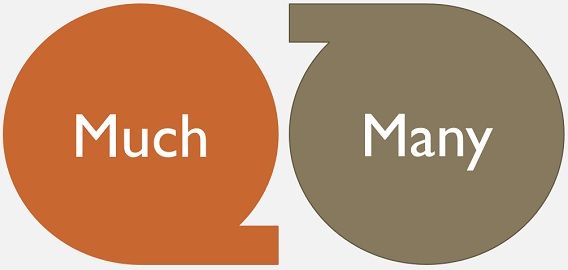 The words much and many are two quantifiers, that is used to indicate a large amount, degree or quantity of something, but not in exact terms. So, they are commonly interchanged, but they are different in the sense that much is primarily used with singular uncountable nouns whereas we use many with plural countable nouns. Let’s look at the examples given below for understanding the difference between much and many.
The words much and many are two quantifiers, that is used to indicate a large amount, degree or quantity of something, but not in exact terms. So, they are commonly interchanged, but they are different in the sense that much is primarily used with singular uncountable nouns whereas we use many with plural countable nouns. Let’s look at the examples given below for understanding the difference between much and many.
- You don’t have to take much tension for the exams, as you have already learnt many chapters.
- How much money do you have? I have many dollars in my pocket.
In the first sentence much is used with tension, which is an uncountable noun, whereas many are used with chapters which is a countable noun. Likewise in the second sentence, much is used with money, which is again an uncountable noun, as you cannot count it as one money, two money, etc. Further, in the second part of the sentence, many is used with dollars which can be counted.
Content: Much Vs Many
Comparison Chart
| Basis for Comparison | Much | Many |
|---|---|---|
| Meaning | Large amount of, or a lot in quantity. | Large number of, or a lot in number. |
| Pronunciation | mʌtʃ | mɛni |
| Used with | Uncountable nouns | Countable nouns |
| Examples | There is much water in the aquarium. | There are many fishes in the aquarium. |
| Riya has gained two much weight in last too years. | Riya has to do many exercises in order to reduce weight. | |
| We don't have much time to spend together. | We have many moments to cherish. |
Definition of Much
Much is a quantifier, that refers to a large amount or degree. We use ‘much’ in the sentences where the quantity of the subject cannot be counted. When ‘much’ is used in positive sentences it means ‘a lot of’ or ‘ a lot of’, whereas when it is used in negative sentences, it means, ‘a little’, of small amount’. Now let’s understand how they can be used in sentences:
- It can be used as a determiner to represent a large amount of a substance:
- There is much water in the pot.
- I like the colour of this top very much.
- It can be used as a pronoun:
- How much time do we have?
- She added too much salt in the soup.
- It can be used as an adverb to show a great degree or intensity of a feeling or action:
- It hurt me very much.
Definition of Many
Anything which is more than one is called as ‘many’. When many is used in a positive sentence it means something which is ‘large in number’ and can be counted easily, whereas when it is used in a negative sentence, it refers to few or something which is small in number.
Most commonly, we use many to form negative and interrogative sentences, while in affirmative sentences we use ‘a lot of’ instead of many. However, many can be used in affirmative sentences when the context is formal. Now, let’s discuss how many can be used as different parts of speech.
- It can be used with a noun as a determiner:
- There are not many teachers in this school.
- I have given many business ideas to him.
- It can be used as a pronoun:
- Many think Twitter is more popular than Facebook.
- It can be used as an adverb to indicate ‘not many’ or ‘too many’:
- How many of you are going to Nepal for vacations?
- Not many people are going to the procession.
Key Differences Between Much and Many
The difference between much and many are discussed in the points given below:
- The word ‘much’ is used to denote something which is in ‘plenty of’, or ‘large in amount’. As against, many refer to numerous or something which is ‘large in number’.
- While much is used with the singular uncountable noun, many are used with plural countable nouns.
- Example: We have been to America, many years ago.
We have much time to visit America.
Examples
Much
- I don’t have much time to spend on this project.
- There is not much water in this bottle.
- How much does the book costs?
Many
- There are many convent schools in this area.
- You can find many branded clothes in the shop.
- How many national parks are there in Uttarakhand.
How to remember the difference
Much and Many are mainly used in forming questions and negative sentences. You can remember the difference between these two by understanding that much is used with uncountable nouns, many are used with countable nouns.






Vasile says
I love the site